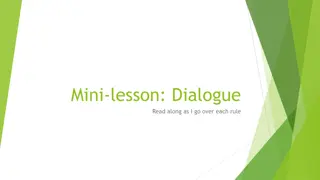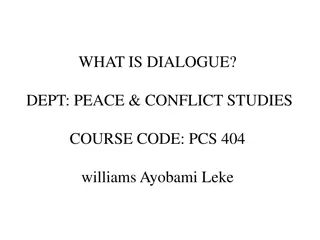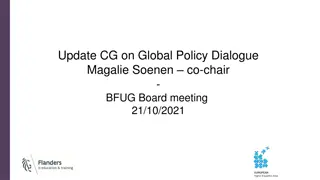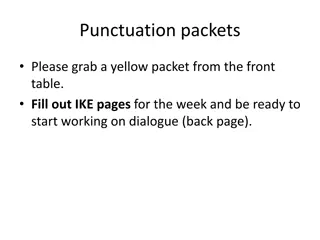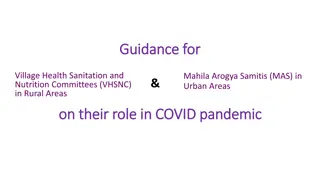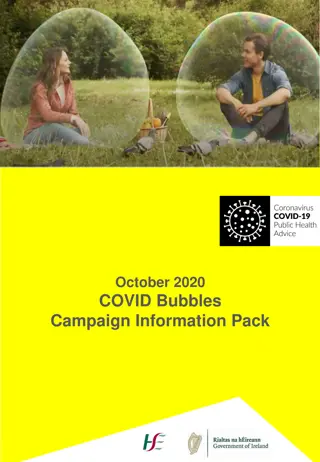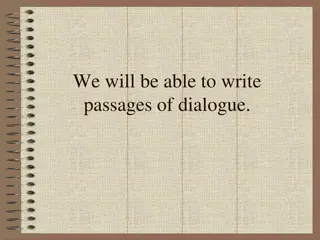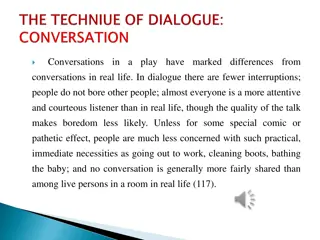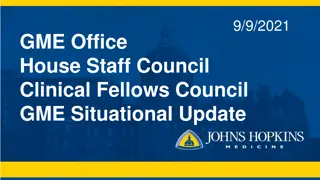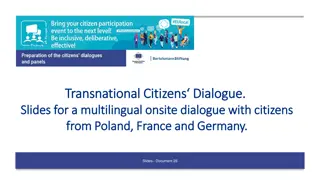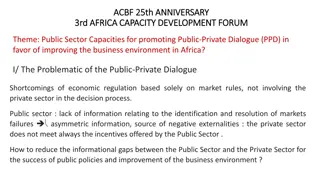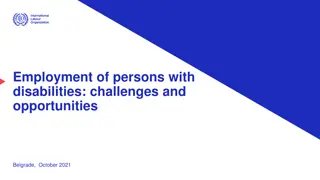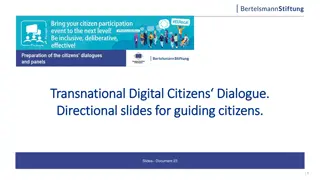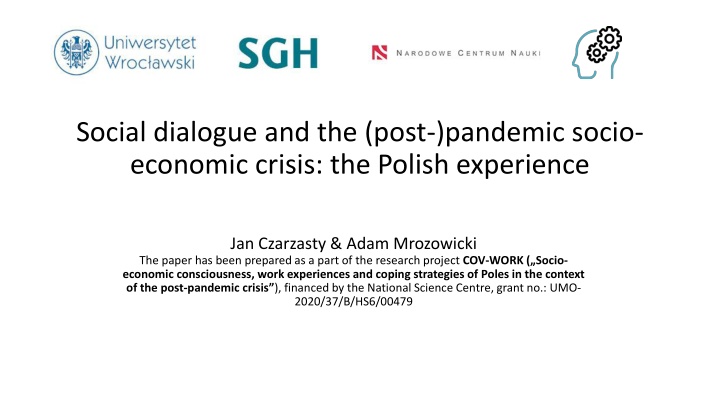
Post-Pandemic Socio-Economic Crisis: Polish Social Dialogue
Explore the impacts of the post-pandemic socio-economic crisis on social dialogue in Poland, examining industrial relations, tripartism, and the effects of anti-crisis regulations. Insights from expert interviews shed light on the state of social dialogue partnerships, with a focus on trade unions, employer organizations, and government relations.
Download Presentation

Please find below an Image/Link to download the presentation.
The content on the website is provided AS IS for your information and personal use only. It may not be sold, licensed, or shared on other websites without obtaining consent from the author. If you encounter any issues during the download, it is possible that the publisher has removed the file from their server.
You are allowed to download the files provided on this website for personal or commercial use, subject to the condition that they are used lawfully. All files are the property of their respective owners.
The content on the website is provided AS IS for your information and personal use only. It may not be sold, licensed, or shared on other websites without obtaining consent from the author.
E N D
Presentation Transcript
Social dialogue and the (post-)pandemic socio- economic crisis: the Polish experience Jan Czarzasty & Adam Mrozowicki The paper has been prepared as a part of the research project COV-WORK ( Socio- economic consciousness, work experiences and coping strategies of Poles in the context of the post-pandemic crisis ), financed by the National Science Centre, grant no.: UMO- 2020/37/B/HS6/00479
Overview Overview Introduction Background: industrial relations and tripartism in Poland An overview of anti-crisis regulations The results of the expert interviews analysis Conclusions
Introduction Introduction Research question: what are the effects of the post-pandemic socio-economic crisis for the state of social dialogue and social conflicts in Poland? Hypothesis: the lack of complementarity at the institutional level, importance of the state in IR ( illusory corporatism , cf. Ost 2009) and organisational weakness of both trade unions and employer organisations will further undermine social dialogue in the post-pandemic situation Data: 20 expert interviews with social dialogue partners at the national level and in the following sectors: education, health care/social assistance, logistics (12 ZZ, 5 OP/P, 3 ADM) plus secondary data /official documents analysis Thematic data coding on pandemic experiences: (1) the relationship of TU and EO with GOV; (2) Bilateral relations of TU and EO; (3) the assessment of the SDC; (4) pandemic and capacity building of social partners (lessons learnt)
Background: industrial relations and tripartism Background: industrial relations and tripartism in Poland in Poland Patchwork nature of industrial relations mirroring the patchwork nature of Polish capitalism (Rapacki et al. 2019) Decentralised collective bargaining, falling coverage, ongoing de-unionisation, employer organisations absent from multi-employer CB (EOs or just business associations?) Weakness of both trade unions and empoyer organisations, as none of them posses a hold over labour market (Traxler 2010; Keune and Pochet 2010) Resilient unilateralism of the government Illusory corporatism (Ost 2000, 2011) failed attempts at social pact negotiations, short episode of crisis-corporatism (Czarzasty, Mrozowicki 2020) followed by the breakdown of the Tripartite Commission (TK) in 2013, tripartite social dialogue relaunched in 2015 with the establishment of the Social Dialogue Council (RDS), only to be marginalised again by the government soon after Tradition of special relationship between governments and politically linked major unions (broken in 2007, seemingly revived in 2015 but turned out to be shortlived) Environment of weak institutions, deteriorating even further after 2015, also as a result of intentional political moves (Czarzasty, Rogalewski 2022, forthcoming)
Public aid and social partners involvement Public aid and social partners involvement Anti-crisis shields PFR Financial Shields 1.0 1.0 - - 2.0 - - Micro SMEs Micro SMEs 2.0 - Large 3.0 4.0 5.0Tourist 6.0 Branch 7.0 Branch, extension 8.0 Branch, extension 9.0Branch, extension Tripartite consultations No consultations
Expert interviews analysis (I): TUs and EOs Expert interviews analysis (I): TUs and EOs relations with the government relations with the government 1. Fa ade consultations Short time given, extraordinary measures, 48h reaction time to governmental proposals: no formal consultations of anti-crisis shields and financial shields Diffusion of responsibility: many departments dealing with the same problems Communication with social partners via mass media rather than SDC 2. Unequal treatment of social partners No need to consult regulations due to unshaken government power and support Privileging employers over unions and Solidarity over other unions according to unions Employers lobbying and bilateral talks to include industry-specific aid in anti-crisis shields 3. The waving of pandemic: social dialogue shifted to later phases The shift to informal, ad-hoc consultations in the 1stwave The role of previous contacts and unequal social capital (see point 2) Gradual re-institutionalisation of social dialogue in the next waves Back to illusory tripartism: the case of Recovery and Resilience Plan 4. Pandemic as an excuse for the lack of social dialogue: PR-dialogue 5. Generally positive assessment of anti-crisis measures by EO, less positive by TUs
Recovery Recovery and Resilience and Resilience Plan: illusory corporatism 3.0? corporatism 3.0? Plan: illusory EX_2_OPZZ: KPO (National Recovery Plan)... the idea... I mean, the idea of KPO appeared when this Next Generation EU programme was approved at the EU level. And this is where it all started. And there was... and those five political goals were created there, I think it was called there or something, or six, and the work started. And the Ministry at the end of August, the Ministry of Funds, sent us information that first of all we could submit project fiches within the KPO, it was very interesting, they gave us two days to do it [laughs(...) But they also said: "Listen, there are such"... I don't even know what it was called, but let's call it by its working name: some kind of working groups which will evaluate these fiches which will be submitted. (...) Listen, I think it started its work in September and finished in February... In February? Well, yes, because in February I think the draft KPO appeared, somehow. (...) And suddenly, in February, this National Recovery Plan appeared, in the form it has, because nobody had seen the new version yet, and we started to ask: "OK, but we did some work there for five months. And where is it? Where is the result of this work?". And they answered us that it was just such... "Listen, it was just such an identification of needs". (...) And the Ministry also reported to the European Commission that this was happening. Well, because the attendance lists, it is enough, I don't know, to take a screenshot, you can see that they are there. And it turned out that it was all for nothing. To a large extent.
Expert interviews analysis (II): the bilateral Expert interviews analysis (II): the bilateral relations between TUs and EOs relations between TUs and EOs Multiple patterns on each levels: from bricolage, ad-hoc cooperation to emerging conflicts in all three sectors studied; Quasi-bargaining at the company level as the result of the implementation of anti-crisis measures (25-30 k agreements, mostly with ad-hoc employee representatives) Soft, framework agreements between TU and EO on anti-Covid measures, e.g. in transportation Non-union forms of communication used in pandemic (e.g. in Amazon) Workers protests beyond workplaces under pandemic conditions, the return of White Village (health care), vest protest during Black Friday; blocking delivery of goods; global letter campaign of unions and MPs to Jeff Bezos; walk outs (logistics) street demonstrations (teachers, October 2021) Employers Strike only partially managed by key employer organisations
Expert interviews analysis (III): Expert interviews analysis (III): The role of Social Dialogue Council The role of Social Dialogue Council (RDS) The pandemic as the intensification of earlier crisis of the SDC - the worst period in the SDC history [EX12] pandemic as an excuse for the assault on SCD by giving the PM possibility to dismiss its members in anti-crisis shield: the loss of trust the use of MPs projects to bypass the consultations no legislative initiatives by social partners (!) [EX18] internal competition within social partners (e.g. health care TUs) making it easier for the government to promote own decisions The procedural, technical and substantive deadlock of the SDC The SDC as a platform of signalling problems rather than consultation Very limited consultations of some key projects (e.g. KPO, anti-crisis shields), no consultations of financial shields Extended consultations without outcomes of other projects (the case of remote work) The failed attempt at signing the social pact Initiative from TUs (FZZ) taken by the Minister J. Gowin Limited to the competencies of the Ministry of Development, Labour and Technology Key obstacles: personalisation of project without support of social partners; lack of support of Gowin by the PM Morawiecki; lack of trust of social partners (RDS)
Extended consultations without effects: the Extended consultations without effects: the case of remote work case of remote work EX14, Lewiatan: As regards remote work, which is to be included in the Labour Code after Covid, I think that there has not been such a project negotiated with the social partners in Poland for several years, because first the Ministry of Labour, outside of all official and media channels, in September 2020 made available to the members of the Social Dialogue Council such a working project on remote working. We worked on it for three or four months, we had meetings, sometimes even once a week, with labour ministry experts, trade unions and us. Even later there were autonomous negotiations between us and the trade unions. It didn't work out. Later it entered the social agreement, where there were negotiations again. We did not succeed. Then there is this draft now from the government, the official government draft, which was also, had to be consulted, so we sent our comments again, so you can say that the effect is unknown what it will be, but it's been a long time since such a consulted topic was there.
Expert interviews analysis IV: Pandemic and Expert interviews analysis IV: Pandemic and SD capacity building? SD capacity building? Pandemic is generally seen as an opportunity for the development of employer organisations and trade unions by their leaders Better cooperation between EOs (less obvious among TUs, but here also as I the health care/public services greater emphasis on co-operation) No decline in membership of major TUs and EOs, successful TU organising DPS/nursing homes organised by the Trade Union Organising Centre Trade union organising and renewal in Sanepid Better visibility of social partners in new social media, e.g. on the role of public services Technological development: digital skills of leaders at various levels Remote work moderately accepted; leadership working offline The inclusion of capacity building postulates in KPO / New deal? Pandemic as a driver of social dialogue/ state modernisation?
Conclusions Conclusions Patchwork character of the IR system and the turbulent nature of the pandemic further undermine the institutional channels of social dialogue in Poland: ad-hocratism, bricolage, diffusion of responsibilities; The continuous crisis of the tripartite social dialogue deepened by pandemic: the worst period of the SDC; no consultations of financial shields and very limited, mostly informal, quasi-consultations of other anti-crisis measure Quasi-bargaining at the workplace level triggered by anti-crisis shields; the limited scope of workplace conflicts and further shift to new forms of conflicts beyond a workplace; The shift to informal channels of influencing policy making mediated by unequal social capital / access to the government; employers lobbying to include specific, industry-level aid in the anti-crisis shields and TU lobbying to secure the interests of workers [with standard employment contracts] Despite the lack of social dialogue, the outcomes of anti-crisis measures are generally positive assessed by EOs (and GOV), less by some TUs ; Some positive effects of pandemic on social dialogue in the area of social partners capacity building;



